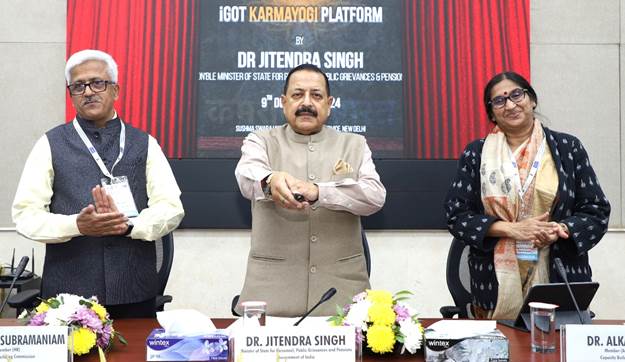Dr. Jitendra Singh, the Union Minister of State (Independent Charge) for Science and Technology, Earth Sciences, PMO, Department of Atomic Energy, Department of Space, and Personnel, Public Grievances and Pensions, launched the “Amrit Gyaan Kosh” Portal to enhance governance training in India. This initiative aims to empower public administrators with comprehensive resources and training, aligning with the nation’s developmental goals.
Key Highlights
- Launch of Amrit Gyaan Kosh Portal: The portal is part of the iGOT platform, developed in collaboration with the Capacity Building Commission and Karmayogi Bharat. It serves as a repository of best practices, case studies, and teaching materials aligned with 15 of the 17 Sustainable Development Goals (SDGs).
- Inauguration of Advanced Case Writing and Teaching Workshop: This workshop, organized by the Capacity Building Commission in partnership with the Stanford Leadership Academy for Development and the Asian Development Bank Institute, focuses on strengthening governance training and capacity building for public administrators.
Dr. Jitendra Singh’s Address and Remarks
During the event, Dr. Singh emphasized the importance of case studies in bridging the gap between theoretical knowledge and practical governance. He commended the dedication of faculty members from Central and State Training Institutes in shaping future public administrators and expressed optimism about the transformative outcomes of the workshop.
Key Points from Dr. Singh’s Address:
- Importance of Case Studies: Case studies are vital in connecting theory with real-world governance challenges.
- Launch of Amrit Gyaan Kosh: The repository is designed to be inclusive and accessible, featuring case studies, teaching notes, and resources in Hindi and Braille.
- Encouragement for Contribution: Dr. Singh urged participants to contribute new case studies to further enrich the repository.
The Advanced Case Writing and Teaching Workshop
The workshop aims to develop advanced case writing and teaching methodologies for educators in the public administration sector. Led by experts from the Stanford Leadership Academy for Development, the workshop focuses on:
- Developing Structured Case Studies: Participants will create case studies addressing real-world administrative challenges.
- Enhancing Teaching Methods: Educators will learn new approaches to case-based teaching, contributing to the Amrit Gyaan Kosh.
Selection and Participation
The workshop was attended by 60 top faculty members, selected from over 300 nominations. This marks the beginning of an intensive training phase, where the participants will create publishable case studies and contribute to the collective knowledge base on the iGOT platform.
Dr. Singh’s Remarks on the Workshop:
- Rigorous Selection Process: The workshop participants were carefully selected to ensure the highest quality of contributions.
- Self-Reliance in Governance Training: Amrit Gyaan Kosh is not just a repository but a platform to promote self-reliance in governance training.
Conclusion and Future Prospects
Dr. Singh concluded by appreciating the efforts of the Capacity Building Commission and emphasized that the outcomes of this initiative will significantly strengthen India’s public administration system. He expressed confidence that the case studies and teaching methods developed in the workshop will contribute to the country’s governance excellence, aligning with the vision of a “Vikasit Bharat 2047.”
Multiple-Choice Questions (MCQs):
1. What is the primary purpose of the “Amrit Gyaan Kosh” Portal launched by Dr. Jitendra Singh?
a) To promote digital governance
b) To strengthen governance training
c) To provide health-related resources
d) To develop space technologies
Answer: b) To strengthen governance training
2. Which institutions partnered with the Capacity Building Commission for the Advanced Case Writing and Teaching Workshop?
a) Stanford Leadership Academy for Development and Asian Development Bank Institute
b) Indian Institutes of Technology and World Bank
c) Karmayogi Bharat and Ministry of External Affairs
d) Indian National Congress and United Nations
Answer: a) Stanford Leadership Academy for Development and Asian Development Bank Institute
3. How many top faculty members were selected for the workshop?
a) 100
b) 60
c) 300
d) 50
Answer: b) 60
4. What is the significance of Amrit Gyaan Kosh in governance training?
a) It is a platform for promoting global governance standards
b) It is a repository for best practices and case studies
c) It focuses solely on health governance
d) It is a digital platform for administrative challenges
Answer: b) It is a repository for best practices and case studies
5. What was Dr. Jitendra Singh’s view on the role of case studies in governance training?
a) They are unnecessary for practical learning
b) They bridge the gap between theory and practice
c) They are only useful for administrative staff
d) They are not relevant to public administration
Answer: b) They bridge the gap between theory and practice
